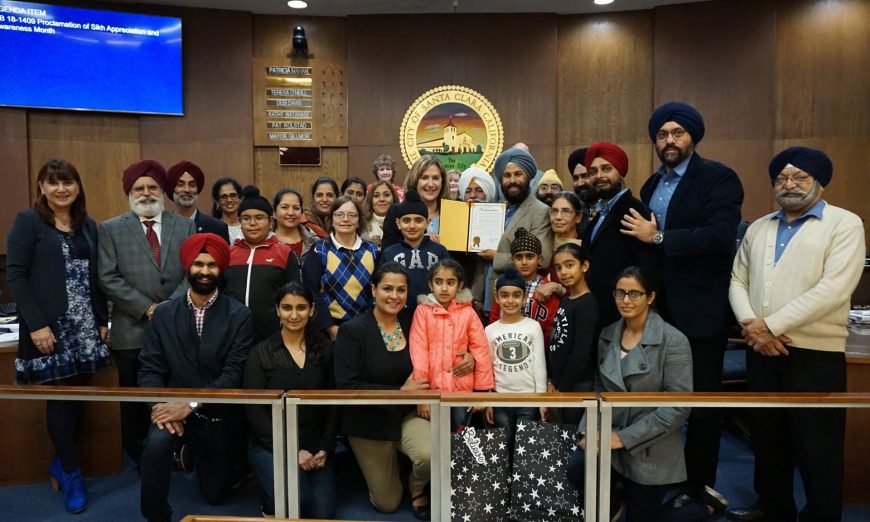The first thing to know about Sikhism is how to pronounce it. It is pronounced like “sick” not “seek.”
“Coming to the U.S. [from India] in 1990 was a big shock for me,” said Santa Clara resident Daljit Kaur Chahal, who is a Sikh. “During that time there were not many Indians in the Bay Area. Not many people knew about Sikhism.”
Sikhism, founded in 1469 in the Punjab region of India, is the fifth largest world religion. Yet even now, almost 30 years after Chahal arrived in the U.S., Sikhism is known in the U.S. more by the appearance of its followers than its core principles.
A man with a turban and beard or a young boy with his uncut, long hair in a bun covered with a patka (cloth) atop his head is immediately identified as a Sikh, which can make them easy targets for discrimination or bullying.
Santa Clara Cultural Commissioner Harbir Kaur Bhatia, a Sikh, came to the U.S. from India with her family in 1978 and recalls defending her younger brother against bullying. According to a Sikh Coalition study, half of Sikh American youth say they are bullied in school.
Core Principles
Chahal, whose husband is newly elected Santa Clara City Council Member Raj Chahal, explains that the three core principles of Sikhism have always guided her personal and professional life: remember God’s name in all endeavors; earn your livelihood honestly, through hard work; and selflessly serve and share with others, especially the poor and needy.
Daljit and her husband formed the nonprofit Chahal Family Charity as one way of sharing. They prepare breakfast for the homeless in San Jose. And since 2015, they have provided an early Thanksgiving dinner for special-needs students in the Independence Network at Santa Clara Adult Education.
Equality
Sikhism upholds the equality of all people. Thus, so one’s name would not reveal one’s lower or higher caste origins, in 1699 in India, Gobind Singh, the tenth Sikh Guru (divine spiritual messenger), directed Sikhs to give all women the same surname: Kaur. Men were named Singh.
Daljit Kaur Chahal and Harbir Kaur Bhatia, along with most other Sikh women in the world, all share the name “Kaur.” Pronounced like an apple “core,” it is used either as a middle or surname.
November was Sikh Awareness and Appreciation month in Santa Clara. Bhatia, who calls herself a community activist, sees this as a step towards equality and inclusiveness, not just for Sikhs but for all minorities. She points out that awareness and appreciation are observant, whereas inclusion is a drawing in.
“The community needs to be open. We need to take the extra step to go out of our way to engage people of diverse backgrounds. Go further than halfway,” said Bhatia, a Santa Clara resident since 2004. “Go out of your way to shake the hand of your neighbor and push the barrier of separation.”
Getting to Know Sikhs
Her Name is Kaur, 2014, edited by Bhatia’s friend Meeta Kaur, is a volume of true stories of love, courage and faith written by second-generation Sikh women named Kaur, who live in the Bay Area and beyond. It is available at the City library and through online book sellers. Read about the Sikh Love Story Project at https://sikhlovestories.com/about/.
All are welcome to visit Sikh Gurdwara San Jose. This place of worship, located on 40 acres in the Evergreen foothills, is the largest gurdwara in North America. It is regarded as one of the most beautiful in the world. For information, go to www.sanjosegurdwara.org.







Nice article. Useful insight .
Hearty congratulations to the Sikh community of Santa Clara for the great progress you have made in creating better understanding about Sikhism and helping to bring social harmony. Also thanks to City Authorities for understanding and support.
What’s up with the Unclean-Law Caste that makeup the vast majority of India’s peoples, denied; healthcare, education, welfare. 400,000,000 jobs that pay less then $1.50/day PLUS 1 free meal before work, these victims of India’s caste system seem contrary to your dissertation
• TELL ME THE INFORMATION I READ IS UNTRUE •